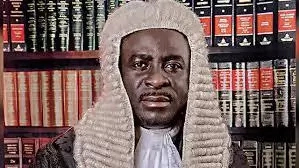6 Exclusive Rights Of A Legal Practitioner In Nigeria
The importance of legal practitioners especially in relation to matters of the law cannot be over-emphasized. Generally, lawyers in Nigeria are professionals trained in the universities and the Nigeria Law School to become barristers and solicitors of the Supreme Court of Nigeria.
The profession is a noble one and lawyers who are referred to as worshipers in the temple of justice are expected to uphold the tenets of the rule of law and justice at all times, this is the primary obligation of lawyers anywhere in the world.
👉 Relocate to Canada Today!
Live, Study and Work in Canada. No Payment is Required! Hurry Now click here to Apply >> Immigrate to CanadaThis articles examines in general the position of legal practitioners in our society, their duties and particularly some rights that are peculiar to them.
Read Also: Functions Of Nigerian Legal System

By definition, a lawyer is a person who has been trained and licensed to practice law, he represents people in legal matters and make legal documents, a lawyer may be called barrister, advocate, solicitor or legal practitioners generally, in some countries, a barrister differs from a solicitor in their duties, however in Nigeria, the legal profession is fused, thus a lawyer can practice as both a barrister and solicitor at the same time.
According to the Legal Practitioners Act, a legal practitioner is described as ‘a person entitled in accordance with the provisions of this Act to act as a barrister and solicitor, either generally or for the purposes of any particular office or proceedings’
The general responsibility of a lawyer is summed up in Rule 1 of the Rules of Professional Conduct for Legal Practitioners thus; a lawyer uphold and observe the rule of law, promote and foster the course of justice, maintain a high standard of professional conduct, and shall not engage in any conduct which is unbecoming of a legal practitioner. It is clear that the legal profession is guided and guarded with strict professional ethics and standards.
The duties of a lawyer are primarily towards his clients, then his colleagues and the court.Towards his client, he owes a duty to dedicate his time and energy to the cause of his client, to represent his client competently in any legal matter, to avoid conflict of interest in any matter he is dedicated to and to protect the privilege and confidence of his client.
To his fellow lawyers, a lawyer is duty-bound to treat them with dignity and respect and to observe good faith when dealing with other lawyers.
Lawyers are officers of the court and as a result are expected to treat the court with respect, dignity and honour and shall refrain from doing an act that may delay or obstruct the administration of justice.
👉 Relocate to Canada Today!
Live, Study and Work in Canada. No Payment is Required! Hurry Now click here to Apply >> Immigrate to CanadaThe position of lawyers is that of dignity and honour, everywhere in the world lawyers enjoy certain privileges and rights, it should however be noted that these rights are professional, exclusive and not transferable. Some of these rights will be briefly described in the following paragraphs:
Read Also: How To Become A Successful Lawyer In Nigeria
1. Legal Representation
Whether in criminal or civil litigation, legal representation may only be made by legal practitioners, the party to an action may choose to represent himself if he is a legal practitioner or if he is capable of such representation or if he could not afford one.
However, if an appearance is to be made, only a lawyer can make one. According to the provisions of section 36(6)(c) of the 1999 Constitution provides that ‘Every person who is charged with a criminal offence shall be entitled to defend himself in person or b legal practitioners of his own choice’
Furthermore, section 8(1) of the Legal Practitioners Act confers on legal practitioners the rights of audience in any court in Nigeria and to represent other persons in a legal proceeding.
However, for this right of audience or representation is subject to the payment practicing fees as may be prescribed from time to time by the Attorney General of the Federation after consultation with the Bar Council.
2. The Names Of A Legal Practitioners
Only persons who have been called to the Nigerian Bar can use the name legal practitioners and other appellations that are reserved for legal practitioners such as ‘barrister’, ‘advocate’, ‘solicitor’ and ‘lawyer’.
Section 22(1) of the Legal Practitioners Act provides that any person other than a legal practitioner who practices or holds himself out to practice as a legal practitioner or takes the title of a legal practitioner or willful takes or uses any name, title, addition or description falsely implying that he is a legal practitioner or is qualified to or recognized by law to act as a legal practitioner is guilty of an offense and is liable to a term of imprisonment not exceeding two years or a fine of #200 or both.
Read Also: How Much Does It Cost To Hire A Lawyer In Nigeria?
3. Preparation Of Document
It is also the exclusive rights of legal practitioners to make certain legal instruments in Nigeria. Section 22(1)(d) of the Legal Practitioners Act makes it an offense for any person who is not a legal practitioner to make certain documents in Nigeria.
4. Right Of Appointment As Judges
In Nigeria, only legal practitioners can be appointed as judges of superior courts, this requirement may however not apply to customary courts and sharia courts, customary and sharia courts of appeal. All other superior courts have this requirement. For instance section 231(3) of the 1999 Constitution provides that;
A person shall not be qualified to hold the office of Chief Justice of Nigeria or a Justice of the Supreme Court, unless he is qualified to practice as a legal practitioner in Nigeria and has been so qualified for a period of not less than fifteen years.
All other superior courts that is to say the Court of Appeal, Federal High Court, National Industrial Court, State High Courts and even Magistrates courts requires that the judges must have been legal practitioners for a number of years stipulated by the Constitution.
5. Right Of Appointment As Notary Public
According to the provisions of section 2 of the Notaries Public Act, it is the duty of the of the chief Justice of Nigeria to appoint persons who are fit to be notaries public in Nigeria. Thus act also requires that persons who may be appointed as notaries public must be legal practitioners.
A notary public is an officer of the supreme court who gives credibility to documents by witnessing the making and signing of such documents and appending his own signature or seal. They also administer oaths and take affidavit and declarations.
Read Also: Punishment For Impersonation Under Nigerian Criminal Law
6. Right Of Apointment As Attorney General
An attorney general is the legal officer of the state. Only a legal practitioner can be appointed to serve in this position.







